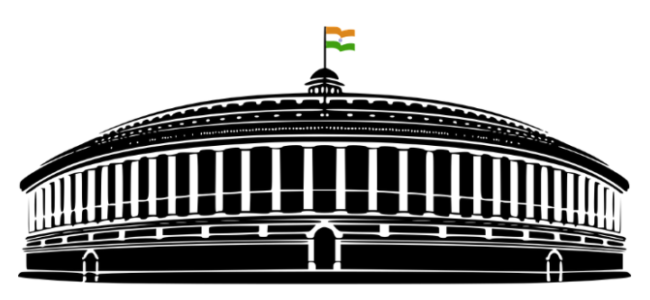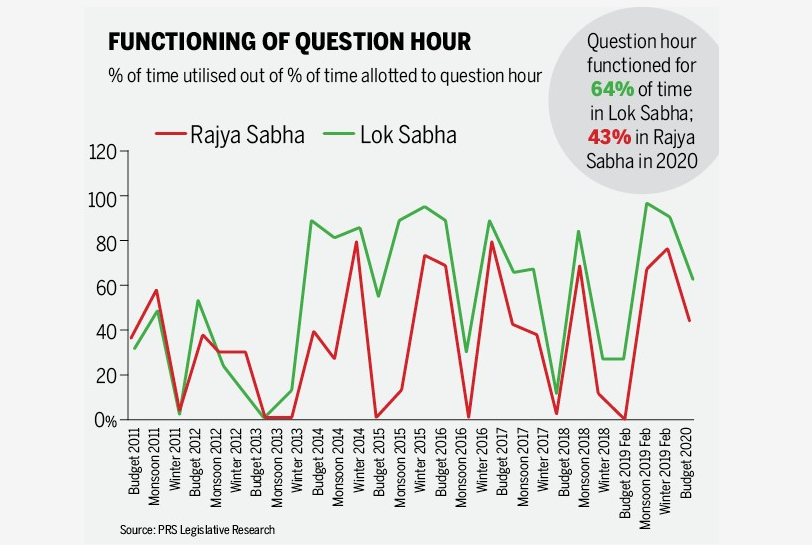Question Hour and Other Instruments for Executive Accountability

From Current Affairs Notes for UPSC » Editorials & In-depths » This topic
IAS EXPRESS Vs UPSC Prelims 2024: 85+ questions reflected
The recent decision to abandon “Question Hour” during the Monsoon Session of Parliament, has evoked serious concerns about the democratic functioning of the institution. Question Hour isn’t just an open door for the members to bring up issues and raise questions, yet it is a parliamentary gadget principally implied for exercising legislative control over executive actions. The decision has been made because of the pandemic and a truncated Monsoon Session. Parliament has also curtailed the Zero Hour. In this context, let’s make an in-depth analysis of the Question Hour and the other instruments for executive accountability.
What is Question hour?
- It is the liveliest hour in Parliament.
- The first hour of every parliamentary sitting is slotted for the Question Hour where Members of Parliament to raise questions about any aspect of administrative activity.
- It is during this one hour that Members of Parliament ask questions to the ministers and hold them accountable for the functioning of their ministries.
- The questions that MPs ask are designed to elicit information and trigger suitable action by ministries.
What is the significance of Question hour?
- With the broadcasting of Question Hour since 1991, It has become one of the most visible aspects of parliamentary functioning.
- Over the last 70 years, MPs have successfully used this parliamentary device to shine a light on government functioning.
- Their questions have exposed financial irregularities and brought data and information regarding the government functioning to the public domain.
- Among the instruments of accountability, the daily ‘Question Hour’ has an unmatched criticality on account of its regularity and its availability on a basis of equality to every Member of the House- Rajya Sabha or Lok Sabha.
Major significances:
Broad Scope:
- It has a special significance in the proceedings of Parliament since it covers every aspect of government activity, domestic and foreign.
Instrument of Accountability:
- During the Question hour, Members of Parliament (MPs) ask questions to ministers and hold them accountable for the functioning of their ministries.
Regularity:
- The daily ‘Question Hour’ has an unmatched criticality on account of its regularity and its availability on a basis of equality to every Member of the House, Rajya Sabha or Lok Sabha.
Leads to Wider Debate:
- Though the questions are pointed & specific, our parliamentary history records instances of answers given to questions leading to wider debates, inquiries, and even administrative scandals.
Stance of Executive:
- The advantage of Question Hour to the government is that its position in the matter is authoritatively explained
Public Awareness:
- The information made available through Question Hour adds to public information essential to informed debates on matters of interest or concern.
How is the Question Hour regulated?
- The presiding officers of both Houses – Rajya Sabha and Lok Sabha- are the final authority for the conduct of Question Hour.
- Question Hour is regulated according to parliamentary rules.
What kind of questions are asked?
- Parliamentary rules provide guidelines for the kind of questions that can be asked by MPs.
- Questions have to be limited to 150 words.
- They have to be precise and not too general.
- The question should also be related to an area of responsibility of the Government of India.
- Questions should not seek information about matters that are secret or are under adjudication before courts.
- It is the presiding officers of the two Houses who finally decide whether a question raised by an MP will be admitted for answering by the government.
What is a starred and unstarred question?
- In a starred question, a member seeks an oral answer from the concerned minister and this can be followed by supplementary questions, whereas in the case of unstarred questions, a written answer is provided, and no supplementary question can be asked.
What is a short notice question?
- The Short notice question is one that is asked by giving a notice of less than ten days. It is answered orally.
What is Zero Hour?
- Zero Hour is an Indian parliamentary innovation.
- It is not mentioned in the parliamentary rule book.
- Under this, MPs can raise matters without any prior notice.
- The zero hour starts immediately after the question hour and lasts until the agenda for the day is taken up.
- That is, Zero Hour is the time gap between the question hour and the agenda.
How do the MPs demand an oral or written answer?
- MPs can specify whether they want an oral or written response to their questions.
- They can put an asterisk against their question signifying that they want the minister to answer that question on the floor. These are referred to as starred questions.
- After the minister’s response, the MP who asked the question and other MPs can also ask a follow-up question.
How do ministers prepare their answers?
- Ministries receive the questions 15 days in advance so that they can prepare their ministers for Question Hour.
- When MPs are trying to gather data and information about government functioning, they prefer the responses to such queries in writing.
- These questions are referred to as unstarred questions.
- The responses to these questions are placed on the table of Parliament.
How frequently is the Question Hour held?
- Question Hour in both Houses is held on all days of the session. But there are two days when an exception is made that is, on the day of President’s address & during the Budget presentation.
How does Parliament manage to get so many questions answered?
- To streamline the answering of questions raised by MPs, the ministries are put into five groups. Each group answers questions on the day allocated to it.
Are the questions only for ministers?
- MPs usually ask questions to hold ministers accountable.
- But the rules also provide them with a mechanism for asking their colleagues a question.
- Such a question should be limited to the role of an MP relating to a Bill or a resolution being piloted by them or any other matter connected with the functioning of the House for which they are responsible.
- Should the presiding officer so allow, MPs can also ask a question to a minister at a notice period shorter than 15 days.
Is there a limit to the number of questions that can be asked?
- In the Lok Sabha, until the late 1960s, there was no limit on the number of unstarred questions that could be asked on a day.
- At present, the total number of questions in both the categories is put in a random ballot.
- From the ballot in Lok Sabha, 20 starred questions are picked for answering during Question Hour and 230 are picked for written answers.
Have there been previous sessions without Question Hour?
- During the Chinese aggression in 1962, the Winter Session was advanced.
- The sitting of the House started at 12 pm and there was no Question Hour held.
- The number of questions can be asked were also decided to be limited before the session.
Why is executive accountability of utmost importance?
- We, the people of India, gave us a Constitution that prescribes for our democracy a parliamentary form of government in which the executive is accountable to the electorate through a legislature which in turn is periodically elected by the electorate.
- This accountability lies at the heart of democratic government and is implemented through procedures put in place by the legislature whose functions include lawmaking, controlling the national finances and approving taxation proposals, and having discussions on matters of public interest and concern.
- Each of these functions is discharged, daily or periodically, during sittings of the legislature and cover questions, adjournment motion, calling attention, half-an-hour discussion, motion of no confidence, questions of privilege etc.
What is the criticism of the government’s move to suspend Question Hour?
Against the Spirit of Democracy:
- Suspension of Question Hour is not a good sign in democratic principles, especially in a parliamentary democracy.
Reduced Space for Opposition:
- The rest of the business of the Houses was tightly controlled and set by the government, leaving only Question Hour to hold the government accountable.
Lacks Consensus:
- The move to suspend Question Hour due to pandemic and to find alternate options was not discussed with leaders of political parties and groups
Bad Precedence:
- Parliament is the beacon of legislative functioning and its functioning will set the precedent for Vidhan Sabhas to follow in the future.
What could be the way forward?
- The World over, the legislative bodies have continued to function with new sets of Do’s and Don’ts.
- Some Do’s and Don’ts can be introduced in the Parliament.
- Admit the Starred Question, reply to it with a set of prepositions and allow the Member concerned to table in writing the permitted number of follow up questions also to be answered in writing the following day.
- This can be supplemented, on occasions, by using a Motion to develop a consensus ‘on matters of general public interest’.
Conclusion
- It is the ability to face crises — social, economic, political — and seek correctives premised on institutions of democracy is the test of a functioning democracy.
- ‘The politics of avoidance’ as a resort do not help the process.
- The Question hour as an instrument of accountability provides equality to every Member of the House, Rajya Sabha or Lok Sabha.
- Executive accountability can’t be allowed to become a factor of the past.
Practice Question for Mains
- The dropping of Question Hour, which helps the government feel the nation’s pulse, goes against the grain of democracy. Elucidate (250 Words)
If you like this post, please share your feedback in the comments section below so that we will upload more posts like this.




sir ur doing a great job by providing us with these mindmaps
Thanks Dhruv, Good luck with your preparation.